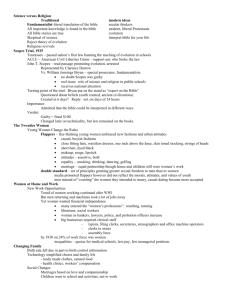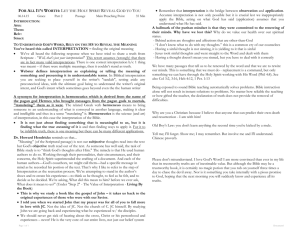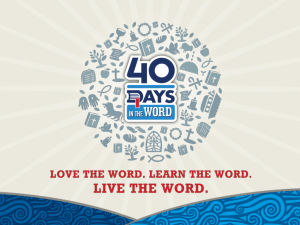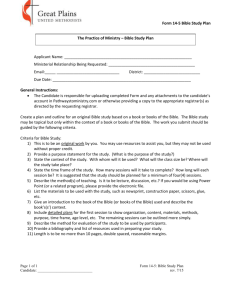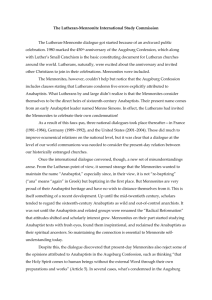Beliefs About Sin Salvation
advertisement
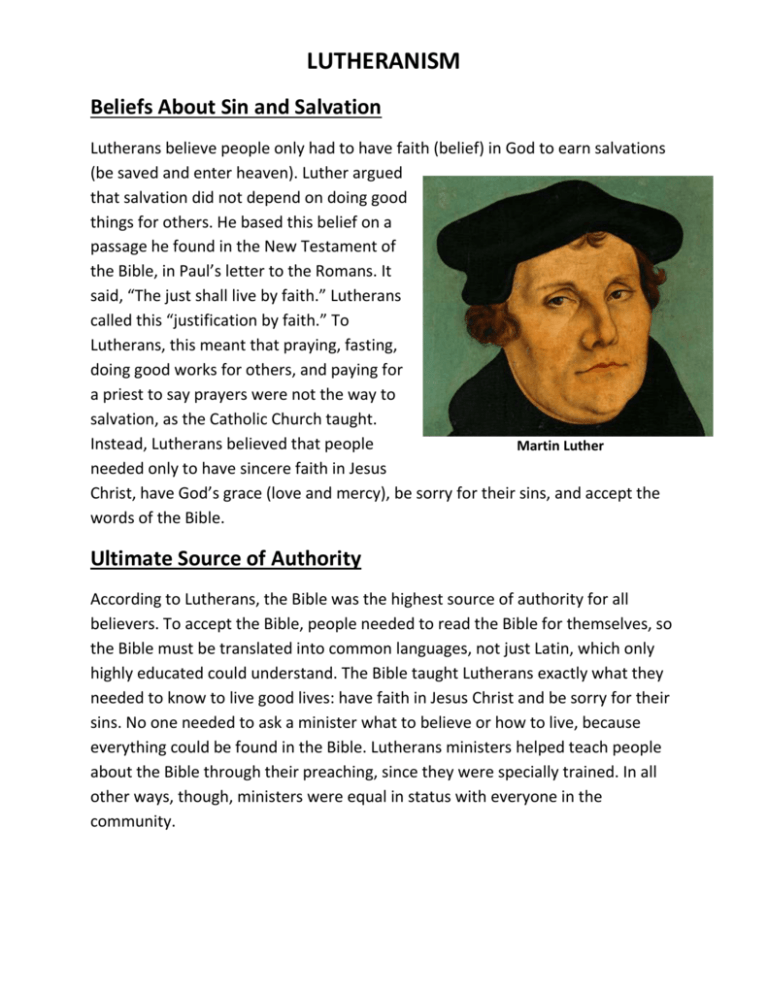
LUTHERANISM Beliefs About Sin and Salvation Lutherans believe people only had to have faith (belief) in God to earn salvations (be saved and enter heaven). Luther argued that salvation did not depend on doing good things for others. He based this belief on a passage he found in the New Testament of the Bible, in Paul’s letter to the Romans. It said, “The just shall live by faith.” Lutherans called this “justification by faith.” To Lutherans, this meant that praying, fasting, doing good works for others, and paying for a priest to say prayers were not the way to salvation, as the Catholic Church taught. Instead, Lutherans believed that people Martin Luther needed only to have sincere faith in Jesus Christ, have God’s grace (love and mercy), be sorry for their sins, and accept the words of the Bible. Ultimate Source of Authority According to Lutherans, the Bible was the highest source of authority for all believers. To accept the Bible, people needed to read the Bible for themselves, so the Bible must be translated into common languages, not just Latin, which only highly educated could understand. The Bible taught Lutherans exactly what they needed to know to live good lives: have faith in Jesus Christ and be sorry for their sins. No one needed to ask a minister what to believe or how to live, because everything could be found in the Bible. Lutherans ministers helped teach people about the Bible through their preaching, since they were specially trained. In all other ways, though, ministers were equal in status with everyone in the community. Rituals and Worship Lutheran church services were a combination of both old Catholic and new Lutheran rituals. Lutherans kept many of the outward appearances of the Catholic mass. Services were held in former Catholic churches. There was an altar, with a crucifix (representations of Christ on the cross) and candles. Ministers dressed in traditional vestments led people through the services. Other parts of the ritual were different from catholic traditions. All the prayers were written and said in Inside a Lutheran Church. German, not Latin, so that all people, especially the uneducated peasants, could participate. Martin Luther translated the Bible into German. Services included Bible readings and a sermon. The sermon was to explain the bible lesson of the day to everyone, since the word of God was the center of religion. Everyone was invited to sing the hymns. During the sharing of Bread and wine, everyone was given both bread and wine. And instead of the seven sacraments (formal holy rituals) of the Catholic Church, Lutherans practiced only two of the sacraments; the ones they believe were clearly named in the Bible: Baptisms and communion. Community Life To help his followers adjust to living with a new set of beliefs, Luther made some new rules for Lutherans to follow. Over time, he preached less about the Bible and more about strict discipline and strong families. Luther told his followers that fathers were responsible to teach their children religion by having them pray before each meal and before bed, “unless they [pray], they should be given neither food more drink.” He also preached that women’s work in life was to be married and give birth to as many children as possible. Luther thought these rules would help Lutheran communities to grow and be strong and be strong and unified. From: History Alive ANGLICANS Beliefs About Sin Salvation Anglicans believed that all people are born sinful (with “original sin”), but that sin could be washed away through baptism. They believed in the “justification by faith” that Martin Luther taught the Lutherans. This idea was that people only had to have faith (belief) in God and have God’s grace (compassion) to earn salvation (be saved and enter into heaven). They believed that salvation did not depend on doing good things for others. This meant that praying, fasting, and doing good works for others was not the way salvation. Instead people needed only to have faith in Jesus Christ, be sorry for any sins (according to the Ten Commandments in the bible), and accept the word of the bible. Henry VIII – his first wife, Catherine of Aragon, failed to give him a male heir. When the Pope refused to grant him a divorce, he asked Parliament to proclaim him “Supreme Head on Earth of the Church of England” Ultimate Source Authority The Anglicans based their beliefs on the Bible, but saw the King of England as the head of the Church, the person who should interpret what the Bible really meant. The King relied on the assistance of the Archbishop of Canterbury, the most important bishop (church official). Beneath him were bishops and priests to help pass on the King’s words about religion. Because the teachings of the Church filtered down through so many layers of people (from king to archbishop to bishops to priests to people), local parish priests had many opportunities to teach their over versions of Anglican Christianity. As long as the priests and the members of his parish obeyed the laws of the land and were loyal to the King, they weren’t held to strict interpretation of Church beliefs. Rituals and Worship There were two versions of the Anglican Church service: the: the “High Church” service, which closely followed the Roman Catholic Mass, and the “Low Church” service, centered on preach from the Bible, like the Lutheran service. This varied from parish to parish, usually depending on the personal beliefs of the local pastor. Services were held in former Catholic churches and monasteries, but most of the statues, paintings, and interior decorations had been removed. The inside of the buildings were painted completely white, with the Ten Commandments painted on the plain walls. Services were held in English rather than Latin, so everyone could participate. Over time, a Book of Common Prayer was written for all church members. It was filled with English translations of prayers so everyone, not just priests, could say the prayers. The 1662 English Book of Common Prayer – It forms the historical basis for most Anglican liturgy around the world. Community Life Anglican communities were not all alike. High Church communities tended to be made up of the wealthy class, and some lived in large mansions that had once been monasteries. Low Church communities were more often made up of the middle and lower classes. The people in Anglican communities were flexible and believed in giving privacy to each person’s conscience (sense of obligation do right), so all people could determine how best to live based on their religious beliefs. In the 1560’s, Queen Elizabeth I said that even though she was head of the Church of England, she believed that no ones’ conscience should be forced to believe or practice a certain version of Anglicanism. As long as people were obedient to English law and royal to their queen, they could believe as they wanted. From: History Alive ANABAPTISM Beliefs About Sin and Salvation Anabaptists came together in Zurich, Switzerland in 1525 because they wanted radical reform of the Catholic Church. They did not believe in baptizing (a ritual, or ceremony, to admit a person into the church community) children like the Christians did. They thought that only adult believers could be baptized. All Anabaptists had to be re-baptized when they joined the church. Anabaptists’ Cages: Sketch of the 1535 execution of leaders of the sect in Münster, and the photo of the church where their corpses were displayed. The cages still remain. Anabaptists believed that sin was everywhere in the secular (nonspiritual) world. Therefore, they believed that no one who lived in the world could go to heaven. Baptism could wash away the sin people were born with (original sin), but after baptism, people needed to avoid more sin. The only way to earn salvation was to stay away from the world. To stay away, Anabaptists lived secluded lives in small villages. They shunned the sinful world by avoiding involvement in government and wars, two of the most sinful aspects of the world. Ultimate Source of Authority Anabaptists believed the New Testament of the Bible was God’s final revelation and the source of doctrine and God’s commandments for godly living. They believed in living a simple life exactly as it was led by people described in the Bible. If Anabaptists were called to testify in court, they didn’t think they needed to swear on the Bible because it was already the strongest influence in their lives, in court or out of court. Anabaptists thought no one could decide to live a serious committed life until they were mature adults. This is why Anabaptists believe only From: History Alive adults could make the decision to be baptized and join their church. They believed the Bible told them to overcome evil with good. By living simple, loving lives based on the Bible, they believed they would defeat evil in the world. Anabaptists also taught they didn’t need priests to tell them what to do because every adult would know how to behave by reading the Bible. Rituals and Worship Just as Anabaptists shunned (avoided ) the world outside their community, they also shunned the religious practices of that world. They did not meet in churches, but had meetings in the home. They did not allow religious statues, paintings, crucifixes, or other decorations in their homes that might distract them for the Bible and their faith in God. They believed that a religious community did not need priests or ministers to lead their groups, so the groups led services themselves. Anabaptists believe in only two sacraments: baptism (for adults) and the Eucharist (communion). Though Anabaptists brought their children to meetings, they did not believe a person could really take part in ritual until adulthood, so that person clearly understood all the meaning in the ritual. Community Life Anabaptist communities were usually set apart from other people for two reasons. First, Anabaptists did not want to be part of sinful world. Second, other religions attacked the Anabaptists for their beliefs. Because all Anabaptists were trying to love the same simple life, based on the Bible, all their communities followed the same rules. They did not get involved with the outside world, and they did not hold any government office. Most groups of Anabaptists did not use weapons or fight in wars, and they believed in freedom of religion for all people. They became known for being very tolerant of other religions, and their communities were often refuges (safe places) for people, such as Jews, escaping religious persecution. Anabaptists believed in leading a simple life. Their homes were plain, not decorated, and they farmed using simple technology, no matter what new inventions came along. From: History Alive CALVINISM Beliefs about Sin and Salvation Calvin believed in “predestination.” This was the idea that at the beginning of time, when God created the world and everything in it, God had already decided everyone who would ever be born and each person’s destiny (whether or not people would be allowed into heaven at their deaths). Therefore, faith (belief in God) was a gift from God and a person was either born with it or without it. Nothing a person could do would ever change that destiny. Calvin said “Eternal life [in heaven] is ordained (decided) for some, eternal damnation [in hell] for others.” Calvinists’ belief in predestination meant that everyone’s salvation was already decided. No matter how many kind, holy things some people might do, they would not earn their way into heaven if they hadn’t already been “chose” by God before birth. Calvinists believed the world was full of opportunities for sin, but only those who were destined to go to hell would actually sin. To help people behave in a way that would show whether they were chosen or not, Calvin taught many rules to discipline people and keep them away from sin. Singing, dancing, card-playing, gambling, swearing, going to theatres, drinking alcohol, eating rich meals, and wearing jewelry and extravagant clothing were never allowed. Many people followed these strict rules to show that they believed they were saved. Others, however, who weren’t sure, tried to follow rules to convince themselves that they, too, were saved. Ultimate Source of Authority Calvinists believed that he faithful could have a direct relationship with God and that the Bible taught them all the rules they needed to know to live holy, faithful lives. The Bible’s teachings weren’t just rules for the church, however. Calvinists believed the rules should also be the laws for government. In Geneva, From: History Alive Switzerland, Calvin set up a theocracy, (a government in which the same people who control religion control the country). Calvinists stressed hard work, discipline, thrift, morality, and honesty. Citizens faced fines, and sometimes harsher punishments for fighting, swearing, laughing in church, or dancing. Once the church punished a church member for breaking a rule, that member was handed over to the local court system for more punishment. Extremely harsh measures could be taken when a person did not go to church or committed blasphemy (showing disrespect for God). Rituals and Worship Calvinists met up to five times a week for church services, which included long sermons to teach people the proper way to behave according to the Bible. Church buildings reflected the Calvinist belief in simple surrounding: they were often paneled in plain wood, with long simple communion tables and benches for people to sit on. There were no stained-glass windows, gold alters, paintings, or statues. At the center of the room was a large pulpit where the minister stood to preach. People sat around him, men (always wearing hats) on one side of the room, women and children on the other. As part of their religious training, children had to be prepared at any time to answer questions asked by the minister. Failing to know the answer would mean shame and even punishment. Preaching could go no for many hours. Calvinists celebrated two sacraments (formal holy rituals), baptism and the Eucharist (communion), because they were the only two sacraments found in the bible. Community Life Calvinist communities were ruled by religious laws based on the Bible. Babies born in the town could only be given certain Christian, Biblical names. No taverns (bars) were allowed. Inns (small hotels) had to have a Bible available for all guests From: History Alive to read at any time and had to make sure all guests were in bed by nine. No guests in an inn could swear, dance, play cards or dice, or insult anyone in the inn. The owners’ inns were required to report any guest who broke these rules. Every home in the community could be inspected once each year by elders to make sure that everyone in the house was obeying Calvinism’s strict regulations. None in the community was allowed to speak to an offender. People being punished were not allowed to receive communion, though they were allowed to attend services and to listen to sermons to help teach them the correct way to live. If, after 6 months, they didn’t improve their behavior, they were permanently banished from the town. Calvinists believed that correct behavior revealed who was destined to go to heaven. ` From: History Alive





